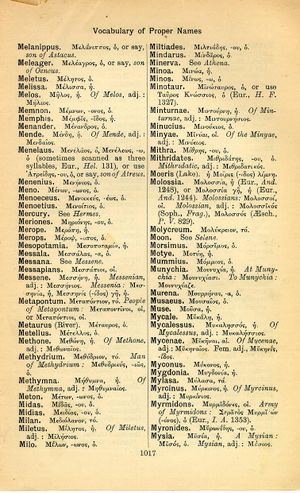Milo
ἄμεινον γὰρ ἑαυτῷ φυλάττειν τὴν ἐλευθερίαν τοῦ ἑτέρων ἀφαιρεῖσθαι → for it is better to guard one's own freedom than to deprive another of his
English > Greek (Woodhouse)
Μίλων, -ωνος, ὁ.
Latin > English (Lewis & Short)
Mĭlo: and Mĭlon, ōnis, m., = Μίλων.
I A celebrated athlete of Crotona, Cic. Fat. 13, 30; id. Sen. 9, 27; 10, 33; Val. Max. 9, 12, 9 ext.; Vitr. 9 praef. § 2; Plin. 7, 20, 19, § 83.—
II A king of Pisa, in Elis, Ov. Ib. 327.
Mĭlo: ōnis, m.,
I a name assumed by T. Annius, as an admirer of Milo of Crotona, and the leader of a band of gladiators. He was the son of C. Papius Celsus and Annia, daughter of C. Annius, who adopted the grandson. He was tribune of the people with Clodius, B. C. 57, but afterwards killed the latter, and was defended by Cicero in an oration still extant (pro T. Annio Milone).—Hence, Mĭlōnĭānus, a, um, adj., of or belonging to T. Annius Milo, Milonian: tempora, i. e. the time when Milo was indicted, Balb. ap. Cic. Att. 9, 7, B, 2.—Subst.: Mĭlōnĭāna, ae (sc. oratio), the oration of Cicero for Milo, Cic. Or. 49, 165; Mart. Cap. 5, § 526. >
Latin > French (Gaffiot 2016)
(1) Mĭlō et Mĭlōn, ōnis, m. (Μίλων), Milon [de Crotone, célèbre athlète] : Cic. Fato 30 ; CM 27.
(2) Mĭlō, ōnis, m., T. Annius Milon [meurtrier de Clodius, et défendu par Cicéron]

